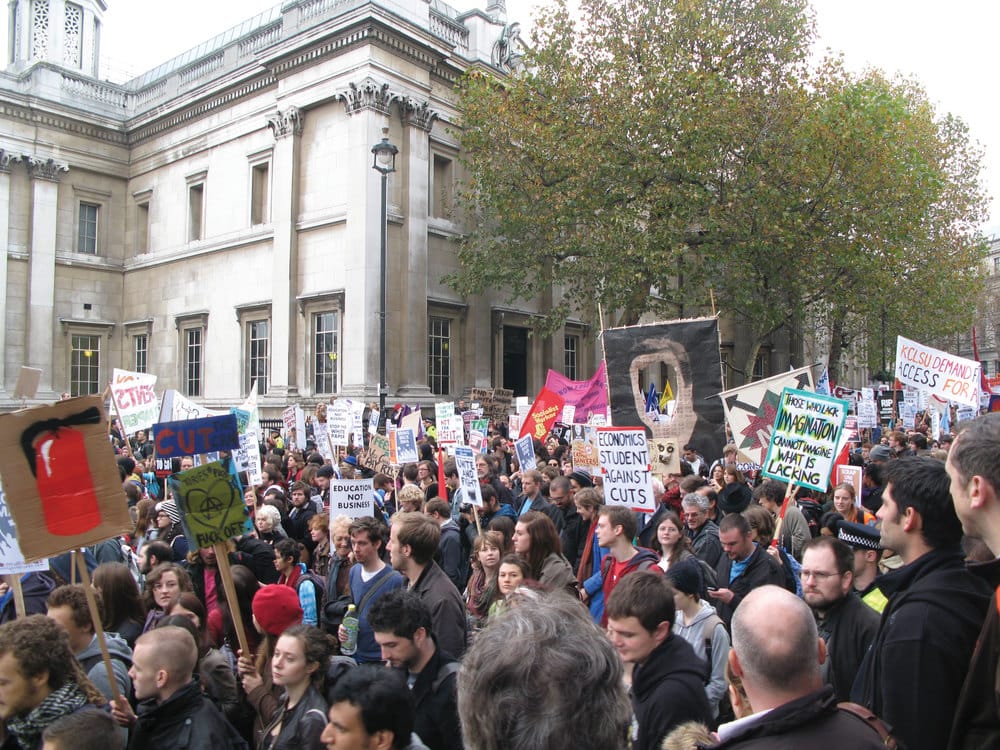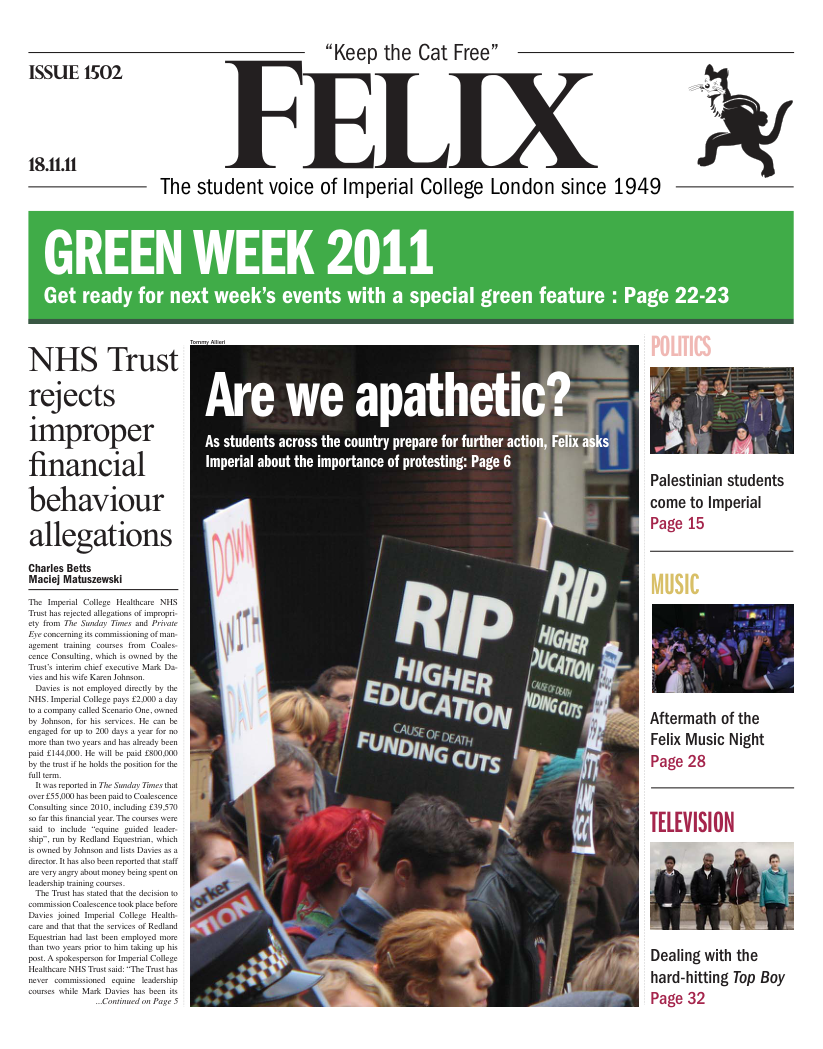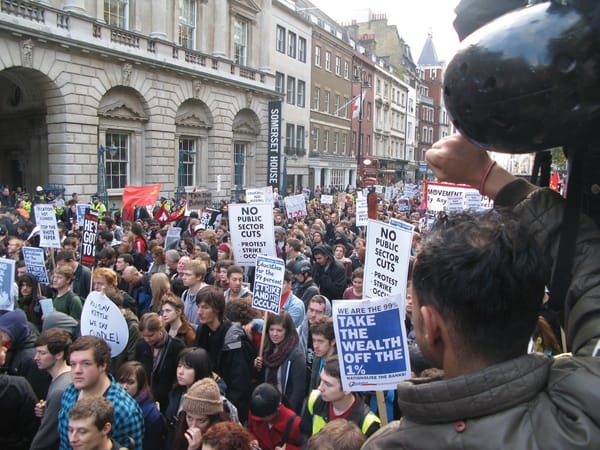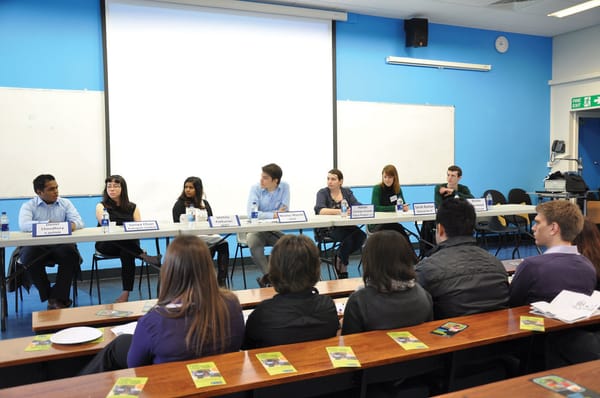Why aren’t we protesting?
Matthew Colvin reports on what prevents students from taking to the streets

The past year has seen student activism reach previously unmatched levels. Just over a year since the first major protest against the Coalition Government’s policies on higher education, the past week has seen another take place on the streets of London. Organiser for the National Campaign Against Fees and Cuts Michael Chessum has announced a further day of action next week on November 23.
These protests have seen vocal support from other universities, yet one constant remains – a perceived lack of interest from Imperial students. Despite the close proximity of Imperial to the heartland of the protests, there has been no recent concerted effort to gather students in an effort to join the protestors.
Felix spoke to students this week in order to determine their opinions towards student protests and unravel the reasons behind what could be perceived as campus-wide apathy. What emerged from conversations were varying claims covering a wide area of Imperial life.
One of the most popular responses students gave for a lack of political activity was a large workload. A first year EEE student remarked that they had “too much work to be bothered,” with a second year biochemistry student referencing “four deadlines last week” as an example of such assignments.
It may have been one of the most popular responses from students Felix asked but could it really be the case that a perceived higher workload is responsible for a lack of political motivation? Other individuals are keen to make mention of Imperial’s unique position as a science-based institution – a second year biochemistry student commented that, “science is in isolation; it’s not about dealing with relationships. People do not disagree that something is wrong but science is not directly about what happens now.”
Equally, it is a possibility that political identity has something to do with the decision of students not to protest. It is, of course, wholly irresponsible to class the majority of Imperial students under one entire ideology, but does this university lend itself to one particular viewpoint? In particular, a viewpoint that encourages uncapped fees in order to benefit the university? Rory Fenton’s article (right) attempts to dissect the issue in greater detail.
Felix contacted Imperial College Conservative Society in order to gauge its opinion on the current political climate amongst students at Imperial, something the chair describes as “very different from 10 years ago at Imperial, where nearly everyone I knew was out en force for the protest against the invasion of Iraq.” When asked as to the reason behind Imperial’s comparative political inactivity today, the chair noted a number of potential reasons, including an “intense” workload, “apathy along the lines of ‘I can’t make’ a difference’” and Imperial’s location in Central London, claiming that “Imperial students would rather be doing something that is more exciting.”
“There are a whole host of reasons in my humble opinion, but I believe raising awareness is fundamental so at least there is an informed choice to be active or not.”
Yet Imperial students have stood together en masse in protest for a joint cause – not in Central London, but at last December’s Life Science Protests. Following the announcement of staff redundancies and departmental restructure in the Department of Life Sciences late last year, over 1000 students signed a petition against the proposed changes. Alongside this, students took to protesting outside a Senate meeting.
Felix spoke to one of the organisers behind the protests, Dan Wan, then a third year biologist, to determine what set this protest apart from others in terms of attracting support from Imperial. “I think when something as emotional as this hits this close to home, people start to take a stand.
Personally, I just felt that I owed to it to the lecturers who had taught and were teaching me at the time. These lecturers had invested so much time in teaching, coaching and interacting with students, bringing us up from freshers to graduates. We all got to know them not just as teachers, but as people. The manner in which these people we respected and admired were being sacked was completely atrocious. I guess someone had to stand up and show the College how badly they were handing the entire situation.”
Asking whether Imperial would benefit from a more politically active and aware student body, Wan believes that, “as a student body, Imperial likes to keep themselves to themselves. In some ways, it can be healthy that Imperial students rather concentrate on the matters that directly affect themselves, such as the Life Sciences Protests.”
When asked why it is that national events do not command the same amount of attention from Imperial students, Wan concedes that this “is something I have always struggle to understand. I don’t think it is a lack of opinion, you can see that through just talking to people around campus. However, I don’t think it is apathy either. There is a lack of encouragement to do so, possibly.
“Maybe the political views are just too varied, and the Union can’t easily pinpoint some and support those. Maybe the Union and its involved students are too wrapped in internal politics to really notice what’s going on beyond Beit Quad to an extent where they would join a protest en-masse. I’m really not sure. I don’t particularly think it is the Union’s fault, either. I know they have done plenty to support and oppose national political proposals in the past. Look at the Browne Report, the President that year was actively involved in consultation with Lord Browne himself.”
Unlike other student unions across the country, Imperial College Union refuses to break ultra vires, or act outside of its constitution. Actively supporting the protests, as sabbatical officers from other UK universities have done, would be an example of this. Felix spoke to Union President Scott Heath and Deputy President (Education) Jason Parmar to discuss their views on the situation. Heath – supporting the view that being at a science-focused university lends itself to students focusing on their degrees and future careers – is keen to stress that the sight of students from other universities protesting is not indicative of the feelings of Imperial students: “We may see counterparts at UCL and LSE leading their students on protests but that doesn’t mean their entire student body is more caring than ours about political issues.”
“Instead of fighting the College about its stance of the £9k fee, the Union worked with it to ensure students are more financially supported when coming to Imperial next year. Student will have more support than they get under the current £3k fee system. Instead of spending hours promoting marches, we are championing the ideas we raised in the NSS response that will directly affect our members and will reap greater benefits for the students of tomorrow.”
Parmar, conversely, supports the view that “it is the political stance of the students as a whole,” alongside a higher workload: “The majority (but of course not all) of our students tend to focus on their degrees and involvement with societies. Our students can often feel like they’re over-worked and don’t feel like they have time to campaign on political issues.”
In terms of actual activism, it is clear that this university is unique. Ultimately, the fact that this institution finds itself in such a science-focused position will allow the debate surrounding student protests to continue for now – behind closed doors.









